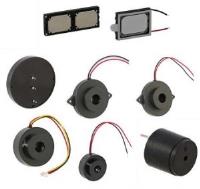 Add My Company
Add My Company
Sign In
BUZZER VS SPEAKER
12-12-2019

Buzzers and Speakers are transducers that convert electrical energy into sound. So, when designing an application that requires an audible alert for user input or alarm function, which should you choose? How do you decided between a buzzer vs speaker?
What is a buzzer?
Miniature Buzzer - ABT-460-RC
Buzzers are also known as sounders, piezo buzzers, audible alarms, audio indicators and piezo transducers. They are piezo or electro-mechanical devices that produce a sound when an AC or DC voltage is applied. This sound is usually a single buzz tone, although dual tone and fast/slow pulse sounders are available. Buzzers driven by DC voltage, Audio Indicators, contain an internal drive circuit. Those driven by AC voltage, Audio Transducers, need additional circuitry to produce a sound.
What is a speaker?
4ohm Miniature Speaker - ABS-224-RC
Speakers use AC voltage to generate sound and require additional circuitry such as an audio amplifier. A speaker reproduces the audio signal it receives so the sound going out is similar to the sound going in. This makes them a good option for voice or music reproduction.
How does a buzzer work?
As mentioned, typically buzzers are either piezo or electro-mechanical devices. How they work is explained in simple terms below:
Piezo buzzer - contains a piezo ceramic element which moves up and down when a voltage is applied. This movement of the disc generates sound.
Electromechanical buzzer – contains a magnet, diaphragm and coil. When a voltage is applied, the diaphragm is pulled towards the magnet. As current flows through the coil a fluctuating magnetic field is produced which causes the diaphragm to vibrate and emit sound.
How does a speaker work?
Speakers contain a magnet, voice coil and diaphragm or cone. As mentioned, they require an AC electrical signal to operate. When this electrical energy is activated it moves though the coil of wire creating a magnetic field. This interacts with the magnetic field generated by the permanent magnet within the speaker. The voice coil moves up and down as it is attracted and repelled by the magnet which in turn moves the speaker cone which the coil is attached to. This movement produces sound.
A good quality speaker produces a very similar sound to the electrical signal sent into it.
Advantages of a buzzer vs speaker
Buzzers
• Size – they are small, compact devices able to produce an audible alert or alarm for a variety of applications
• Piezo buzzers use minimal current so draw less power. Their current consumption is typically less than 10mA.
• Depending on the sound output required, they are usually a cheaper option compared to a miniature speaker.
• DC devices (audio indicators) contain their own drive circuit which makes them a simple and effective solution.
Speakers
• Wide frequency range which makes a speaker more versatile in terms of the sound produced.
• Better acoustic quality.
• Suitable for voice and music reproduction. The quality of this reproduction depends on the technical attributes of the speaker itself.
The decision between buzzer vs speaker will largely be influenced by the demands of the application. Typically, people look at how much space they have for the component and how much power they have available. There are other things to consider when selecting a device:
SPL (Sound Pressure Level) measured in decibels dB. This is the level of sound pressure in front of the buzzer or speaker at a given power at a given distance. It specifies how loud the device will be and how much power is needed to achieve this.
Resonant Frequency – each buzzer and speaker will vibrate at a specific frequency and this is known as the resonant frequency. The component will need to be driven at the resonant frequency to generate the optimum sound output. These specifications are provided on the product data sheets.
Power – For speakers the input power for speakers is measured in Watts. The higher the power, the louder your speaker will be. However, driving the speaker too hard is likely to lead to early failiure rates so it is important not to exceed the maximum power stated on the data sheet.
For buzzers the input voltage is the important factor to consider. The operating voltage for a piezo transducer tends to be wider than electro mechanical transducers. The rated voltage is the voltage that will achieve the best performance/highest sound output at the most efficient power consumption.
In essence, when deciding on a buzzer vs speaker, if you need to reproduce voice, music or multiple sounds then a miniature speaker is likely to be preferable. For a simple buzz tone a piezo transducer or electro-mechanical buzzer will be suitable.
For more information on BUZZER VS SPEAKER talk to Alan Butcher Components Ltd
Enquire Now
List your company on FindTheNeedle.

